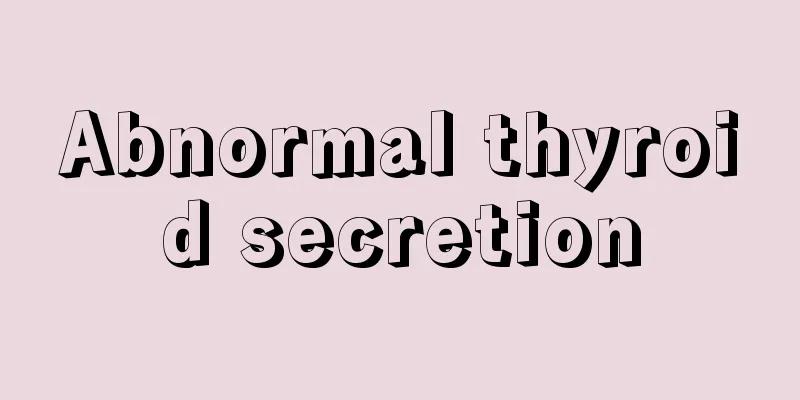Abnormal thyroid secretion

|
The thyroid gland is an important organ of the human endocrine system. If there is any abnormality in it, it will directly affect the health of the human body. The most common one is what we often call goiter, that is, hyperthyroidism, which is a disease caused by abnormal thyroid secretion. Therefore, if you want to stay healthy, it is recommended that you have a comprehensive understanding of thyroid secretion, so that you can clearly know whether there is any abnormality in thyroid secretion and detect the disease in time. The thyroid gland is obviously different from other systems of the human body (such as the respiratory system), but it is closely connected with the nervous system, interacting and coordinating with each other. They are called the two major biological information systems. Without their close coordination, the body's internal environment cannot maintain relative stability. The thyroid gland is the largest endocrine gland in the human endocrine system. After being stimulated by nerves, it secretes thyroid hormones, which act on the corresponding organs of the human body to exert physiological effects. Thyroxine, also known as tetraiodothyronine (T4) and triiodothyronine (T3), are both biologically active thyroid hormones. In addition, trace amounts of biologically inactive trans-triiodothyronine are secreted, both of which are iodine-containing tyrosine derivatives. Excessive secretion of thyroid hormone is called hyperthyroidism, while too little is called hypothyroidism. Both can cause goiter. However, goiter is not necessarily caused by hyperthyroidism or hypothyroidism. It can also be caused by iodine deficiency or increased iodine requirements during puberty and insufficient intake. You can go to the hospital for a thyroid function test to confirm the diagnosis. Hyperthyroidism commonly referred to generally refers to hyperthyroidism associated with Graves' disease, which is an autoimmune disease. Thyroid-stimulating autoantibodies (including TSAb and TBAb) act on thyroid TSH receptors, producing the same biological effects as TSH, causing increased synthesis and secretion of T3 and T4 and enlargement of the thyroid gland. This article has analyzed the diseases caused by abnormal thyroid secretion. Regardless of whether you have too much or too little thyroid secretion, it is recommended that you actively seek medical treatment. Only in this way can you get rid of the trouble of abnormal thyroid secretion as soon as possible and ensure the health of your endocrine system. I hope all friends can understand this. |
<<: Causes of catalyst poisoning
>>: The harm of scar tissue hyperplasia
Recommend
Will nasopharyngeal cancer cause vomiting after eating?
Will nasopharyngeal cancer cause vomiting after e...
What to do if fish sticks to the pan
Fish is a kind of meat we often eat. Compared wit...
How to tell if there are parasites on eyelashes
The presence of parasites in the eyelashes can be...
What to do if a cow has a fever of 40 degrees
We humans often catch colds and have fevers. In f...
How to prevent lung cancer? 9 tips to effectively prevent lung cancer
Factors such as environment and lifestyle are the...
Can burnt coal briquettes absorb formaldehyde?
Coal balls can absorb formaldehyde, but they cann...
What are the obvious manifestations of late-stage renal cancer symptoms?
Symptoms of advanced kidney cancer often include ...
What are the early symptoms of central lung cancer? Five common symptoms of early central lung cancer
Central lung cancer is a type of lung cancer that...
What are the methods to eliminate fatigue
For some reason, people nowadays are prone to fat...
What are the magical uses of egg white
It is generally recognized that egg white can bea...
What should I do if I have a thick bump on my butt
What's the matter with the thick lump on the ...
What should I do if there is a lump in my left breast?
Women need to take care of their breast health. I...
What are the benefits of essential oils?
When doing SPA, masseurs often use essential oils...
What to eat when staying up late_What to eat when staying up late is good for the body
Some people stay up late for longer periods of ti...
Which hospital is good at treating melanoma
Melanoma, also known as malignant melanoma, is a ...









